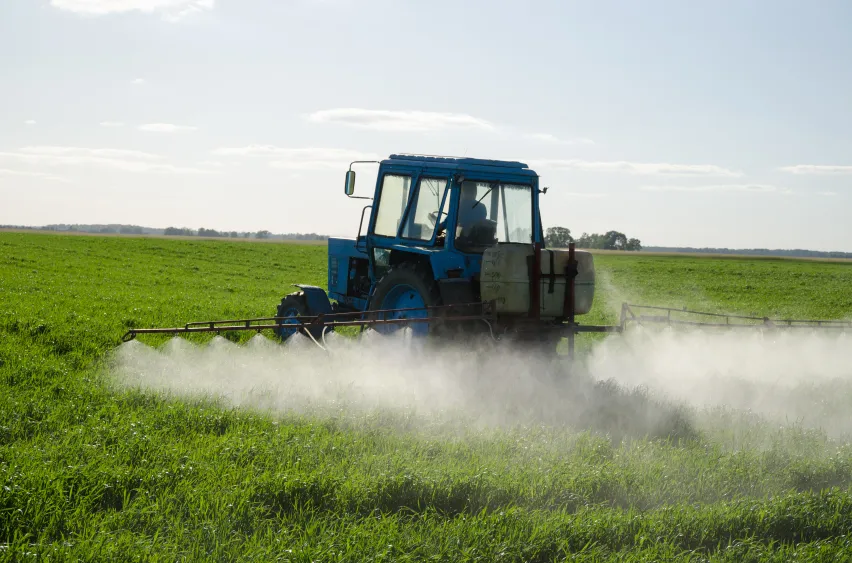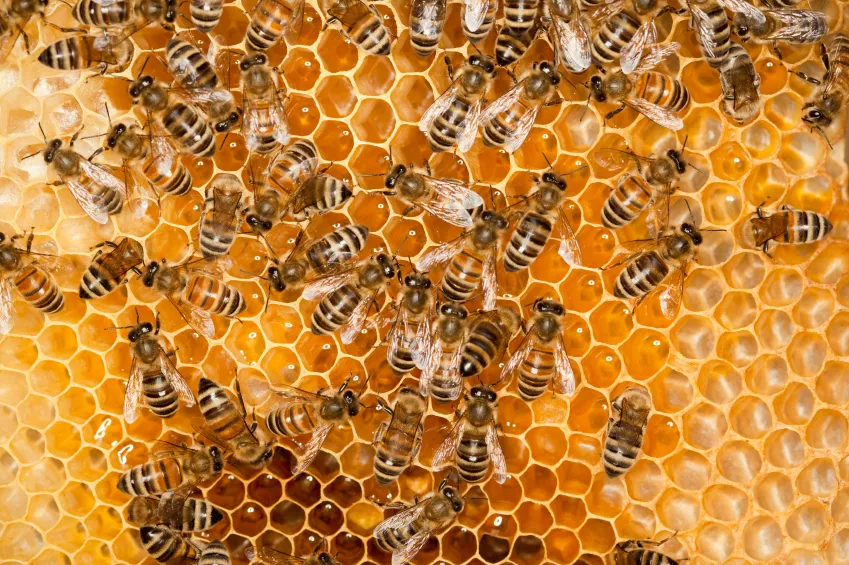What has been banned?
The restriction applies to three neonicotinoid products (clothianidin, imidacloprid and thiamethoxam) used on crops popular with bees, such as oilseed rape. The European Food Safety Authority said the products posed an “acute” risk to bees. Two other neonicotinoids remain unaffected, while those under the ban can still be used on cereal crops, which do not require pollination.
Other causes of bee decline?
“There are other factors, such as the varoa mite,” says the NFU’s Guy Smith. “With an increasing number of amateur bee keepers, we wonder if their hygiene around their bees is always as good as it should be.”
The ban’s impact on farmers
“We are getting reports that farmers are losing 20-30% of their oilseed rape crop this autumn because they cannot use neonicotinoids to deter flea beetle (above),” says the NFU’s Guy Smith. “Some farmers did not bother growing oilseed rape because of the ban and we expect there to be a significant drop in production next year. That will hurt bees as they lose a key crop and the UK will have to import more oilseed rape.”
Could neonicotinoids affect birds?
According to a study in July 2014 by Radboud University in the Netherlands, population trends among insectivorous birds were significantly more negative in areas with higher surface-water concentrations of imidacloprid. Starlings, tree sparrows and swallows were among the most affected. The researchers said that at least 95% of neonicotinoids applied to crops end up in the wider environment, killing the insects the birds rely on for food, particularly when raising chicks.

DID YOU KNOW?
- At least 20 key crops in the UK depend on pollinators. (University of Reading)
- Without pollinators, the price of British apples at the farm gate could increase by 100%. (University of Reading)
- 66% of wild insect-pollinator species – such as bumblebees, hoverflies, butterflies, carrion flies, beetles, midges and moths – have suffered population declines in the UK. (Source: the Environmental Audit Committee)
- Between 1985 and 2005, the number of managed honeybee colonies in the UK fell by 53%.
THE YES AND NO ARGUMENTS
THE QUESTION: Are neonicotinoids responsible for the decline in insects?
THE YES ARGUMENT
Neonicotinoids adversely affect individual navigation, learning, food collection, longevity, resistance to disease and fecundity of bees, according to a report in June 2014 by the World Conservation Union, which assessed 800 peer-reviewed papers on the wider impact of pesticides. For bumblebees, the researchers found “irrefutable colony-level effects have been found, with exposed colonies growing more slowly and producing significantly fewer queens”.
Exposure to neonicotinoids and another group of pesticides, pyrethroids, “impairs [bees’] natural foraging behaviour and increases worker mortality, leading to significant reductions in brood development and colony success”, according to a study by Richard J Gill of the School of Biological Sciences, Royal Holloway, University of London, published in Nature, September 2012.
Neonicotinoids target the area of the bee brain involved in learning, causing a loss of function, according to a 2013 study by Dr Christopher Connolly of the University of Dundee.
“I think neonicotinoids are contributing to the problem,” says Connolly. “They may be making bees susceptible to other things. We have enough evidence to say we are highly concerned about the use of neonicotinoids.”
THE NO ARGUMENT
The UK government argues that, while laboratory studies show high doses of the chemicals harm bees, there is no evidence the pesticides are harmful to bees in the field. “While laboratory studies should as far as possible replicate field conditions, they cannot by their nature do so precisely,” it replied to the Environmental Audit Committee.
“There is a low risk to honey bees from systemic residues in nectar and pollen following the use of thiamethoxam as a seed treatment on oilseed rape and maize,” according to a study for Syngenta and Eurofins Agroscience Services by Edward Pilling of JSC International. “Colonies exposed to the treated crop were able to successfully overwinter and had a similar health status to the control colonies in the following spring.”
New field data from nearly 400,000 bee colonies from 21 countries in Europe show that over-wintering losses of honey bee colonies – an important indicator of general bee health – were at their lowest level in years in 2013/2014, according to Bayer CropScience in August. “These results are very telling since the data relate to a season when neonicotinoid-based crop protection products were still in common use throughout Europe," said Dr Christian Maus, global pollinator safety manager at Bayer.

Opinion: Is the ban long enough?
“The two-year ban will not tell us anything about bees and neonicotinoids,”says Guy Smith, vice-president of the NFU. “We would like to see field trials, as these have not been done before.”
“The ban is a useful step in the right direction – it gives us breathing space to get more data.” says Dr Christopher Connolly of the University of Dundee. “As a precautionary principle, neonicotinoids should at least be suspended indefinitely. But that means using something else. We need to record centrally what the farmers are using in place of neonicotinoids, but that data is not being collected. Large data sets are proving hugely advantageous in many fields.”
“A ban for just two years is no good for anyone” says Nick Mole, policy officer for the Pesticide Action Network. “The crops flowering this year were planted and sprayed with neonicotinoids last year, so the ban is effectively for just the one year, and that’s not long enough to make any meaningful conclusion.”
"There was no baseline set up to gauge what the impact of the ban might be. To do this properly, you need the ban to last at least five years."
